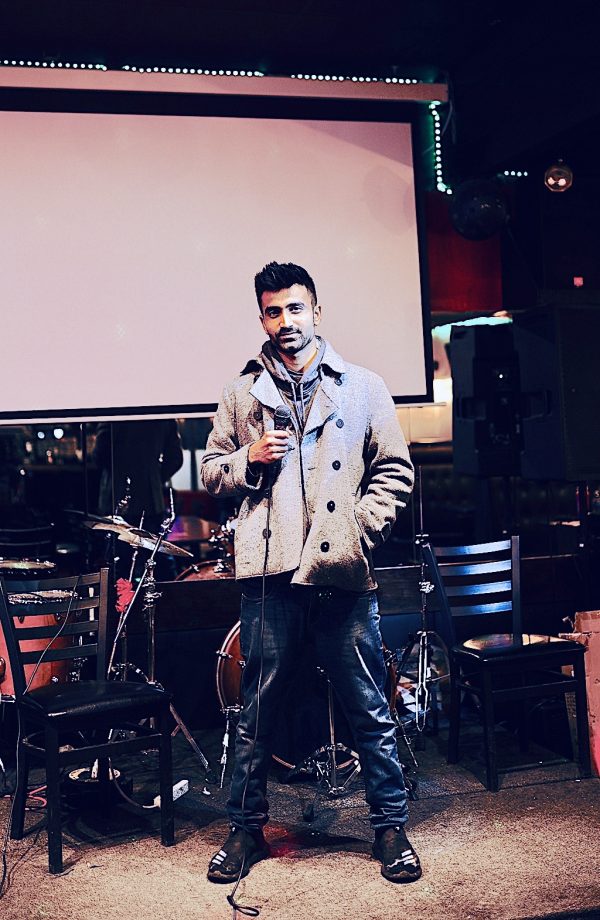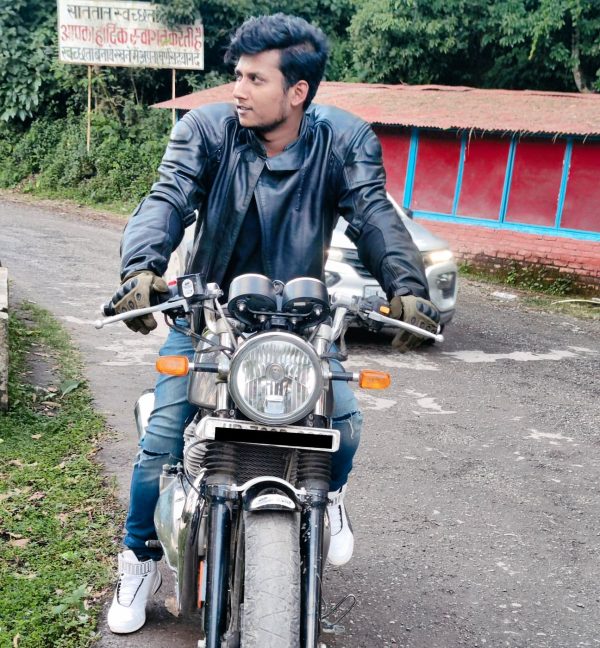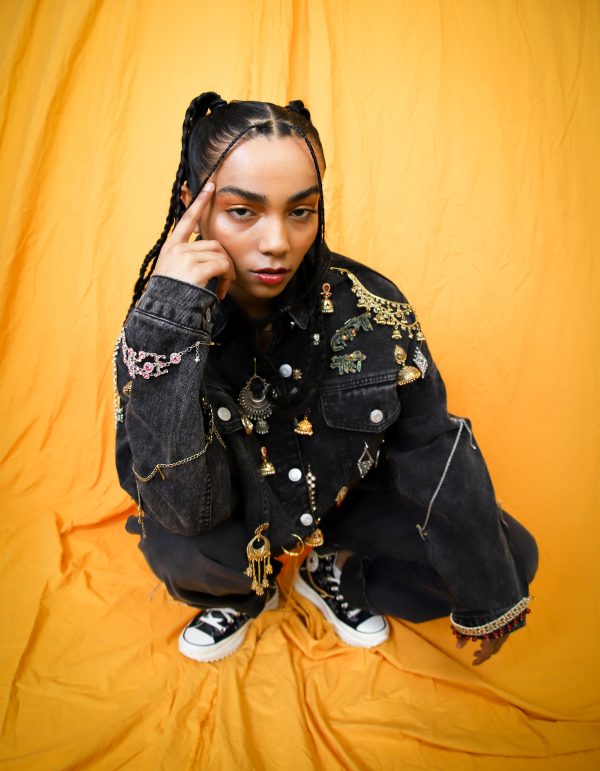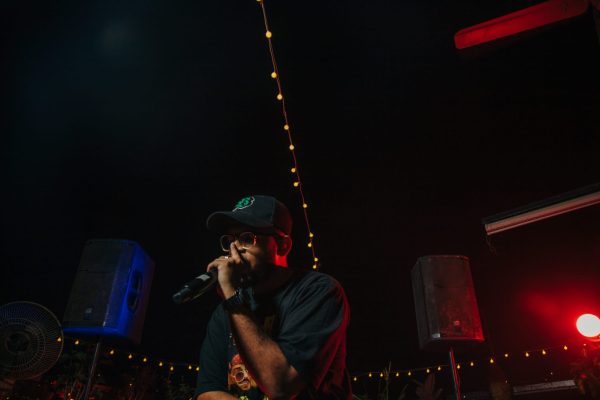We spoke to Mumbai-based rapper Krantinaari about her music, her initiative – Wild Wild Women and her thoughts on hip-hop for women in India, here is the full interview:
Hey Ashwini! We are really glad to have you on our platform. Before we get into the interview, how would you introduce yourself to someone unaware of you?
Hey, This is Krantinaari! I’m a multidisciplinary artist, I do rap music and communication design. I experiment with mural paintings and I love to do visuals along with my music. I am working towards documenting women’s stories across India, that is what my rap music is about. It’s for the people, by the people, to the people and it’s all about the women!
Let’s talk about your musicality. In your recent release ‘Anushasan’, a very hard-hitting piece I must say, you seem to be speaking your heart out and talking about different social issues. What was the intent behind this piece?
As an artist, I believe solo travelling is one of the most important things an artist should include in their practice. The more we look and hear the world outside the more we understand our value in the system better. I strongly feel all art is political. Every statement, every stroke, and every dot one puts on any medium carries the political, social, and emotional existence of an artist. Anushasan is a song of observations during my solo travels to 40 places in India in the past year. My reason for making this song was to bring attention to finer details of our lifestyle which shapes the evolution of our race. Documentation of ignorance and casual behaviours. We all know these issues, we think about them in our rooms of discussions but don’t bother to act on them. I intend to keep pointing it out so that someday we feel the hit and importance of how badly we need to change things in our day-to-day lives to live in a better system.
I can’t help but ask about your debut self-titled track, ‘Krantinaari’, which also happens to be your most popular one on YouTube, amassing way over 1 Lakh views. Now that the song is more than 3 years old, and you have come a long way ahead in your career, how significant do you think it has been in helping you find your artistic side?
It’s very funny actually, that the time I released the Krantinaari song I received a very cold response from the Hip-Hop community saying it was a chant (bhajan) or some said it was good but not technically up there. But you know what the fact is apart from the hip-hop world, everyone who has heard this song has had a very emotional connection to the word ‘Krantinaari’. The women in Rajasthan who I jammed with call themselves Krantinaari, the idea resonated with so many women because women needed a song that belonged to them, they needed an anthem. Krantinaari is not a song anymore, it’s an anthem because every word in that song talks about our core existence of being a woman. Technically speaking, the glossy world of the music industry might need me to make songs that shine on the charts but I feel the simplicity of this song has melted, connected, and empowered hearts. Because it was made that way, I put all I had for a year and a half to make this song. This song taught me the craft of song-making, that every song I ever make should be crafted perfectly with love, sensitivity, research, and empathy.
Tell us about Wild Wild Women. How have the recent shows been?
The idea of Wild Wild Women came out of the fact that no boy’s group included a girl in their crew or solo songs. Can you name any 5 crews who have a female front woman, or just a woman in the crew? NONE, literally none. Labels bring in female artists as just a namesake just to prove their ‘equality’ ideologies (who are then pushed to make songs that are either sexual or make them look dumb). The point is no one included women in their ‘GANG’, stating that women would get married, this time passed for a few years, women didn’t have the skills to rap, women were not serious, and they couldn’t do hip hop because they are too fragile, delicate, vulnerable, weak and so on. With this attitude being around I could still see a few women hanging out at gigs, I met Preeti around a crew, I met Jacquline, I met Pratika, and I heard about MC Mahila. I contacted Flying Machine to put me in touch with Flowraw and MGK. One day we decided to hijack a cypher in Marol, but only 2 women could do this. We needed an army. We then decided to call all the women we knew. No poster, no social media. One call to each. Time and date were shared and boom women came. Dude, you won’t believe everyone sounded so unique to each other that we all were shocked to see ourselves. The idea of WWW is to give a platform to those unique artists who have worked on their craft so hard that their identity is not just gender but their artist statement. WWW is a platform for all genders to go wild with their art.
Our latest show was at the Covalong Surf Festival with approximately 8,000 people. That’s the biggest ever for WWW. It’s just the start I say 😛 Take over scenes man nothing less
Your artistry is a quintessence of conscious Hip-Hop, with the exception that being a female, you are one of the victims in question. How does it feel being one in a rather male-dominated field?
In the world of mainstream entertainment, particularly in music videos and films, there’s a pervasive concept known as the “male gaze.” It centers around catering to male fantasies and desires, rooted in historical gender roles where men were the breadwinners. Even as societal roles have evolved, the entertainment industry has clung to this notion, reserving the space for male pleasure and satisfaction. Despite progress in gender equality and the inclusion of women in the workforce, this aspect of entertainment remains largely unchanged. It perpetuates stereotypes of what a woman should be—fair-skinned, with long hair, and conforming to male expectations. This exclusive focus on visual appeal and conformity marginalizes not only women but also LGBTQ+ individuals, hindering our freedom of expression and reinforcing societal restrictions. This disparity becomes evident when examining music genres like hip-hop. Traditionally, women have been steered toward music that revolves around love and Bollywood, perpetuating a dreamy, waiting-for-prince-charming narrative. In contrast, boys often connect through hip-hop, with its themes and stories more relatable to their experiences. This divide contributes to the underrepresentation of women in hip-hop, both as listeners and artists. However, I believe it’s essential to challenge these norms. I want to create music that tells relatable stories about everyday women, like my song “PCOS,” addressing issues that affect us but often go unspoken in Hindi music. Some might argue that my approach isn’t “pure” hip hop or that it’s too controversial for the genre, but I’m using my platform to express my reality and connect with women who share similar experiences. In the male-dominated world of hip-hop in India, it’s an uphill battle. I must explain my intentions and goals more than my male counterparts. But I’m determined to make a change, even if it takes time, and pave the way for a more inclusive and diverse representation of women in hip hop. So, in essence, the male gaze and gender biases in entertainment remain a significant challenge, but I’m committed to breaking through these barriers and creating music that represents the experiences of women in a male-dominated industry.
What are your views on the current condition of females in this scene? Do you think Male Chauvinism is rather higher in Hip-Hop as compared to other industries?
I don’t think there is a measurement system for how good or how much less or more. We can’t measure it and it is not only in one industry, It is a literal web. It is so connected that a man in the house might not be much of a chauvinist to his daughter, but when he is in the office he is sexist to the women working in that office. These aspects of the toxic social constructs we live with are very common, and that is the problem. There are numerous talented women out there, yet we often see only one prominent woman representing hip-hop. Who controls the entertainment and art scene? Why do women artists, who have a lot to say on crucial topics like women’s health, lifestyle, and livelihood through art, struggle to gain a platform? It’s because they want to suppress us; they fear that women speaking up will disrupt the status quo. Why aren’t women allowed to have power and creative freedom? Labels should sign multiple women at once, allowing them to create without objectification. We’re tired of being judged and labelled. We’re called names and face criticism for simply being ourselves. This is the reality for women in the industry. But the more they try to suppress us, the stronger we become. We won’t resort to violence or compromise our integrity. Instead, we’ll rise with unity, strength, and love to challenge the male-dominated system. A storm of women is coming to break down these barriers and create lasting change.
Do you think some rappers are also responsible for such an environment?
Do you think there is only one particular reason that the soil gets affected or infertile? Do you think that is just because of say, for example, one one fungal fungus molecule or just some small element that can make soil infertile, no right? The whole hand-in-hand web woven system is responsible for the environment. That is, if one thought from one person starts and the others start to follow that thought, everyone is at fault. Whoever supported that thought and the one person who’s thinking might just be fucking around or joking around but 10 people take it seriously. How do we end up with rappers in a conference who have been so misogynistic in their songs are so shit in their heads and think that winning a reality show is like winning the entire nation that they are so privileged to be on a panel where they still talk about their shit stories of how they fuck with women? How is that acceptable? It’s because the rest of the people who signed him who registered him who put them on the panel are also to be blamed. Who the fuck has such a person on stage who can’t even write his emails or can’t even write his message. He is the shittiest. This is the shittiest or the best example to tell you what the scene is like literally like abusing women calling. Her objects calling her a sex toy, calling her fucking nothing is a person who is on stage who 10,000,000 fucking people are gonna listen to and be like. Wow, what a guy! What an inspiration, what an artist! Yeah, for sure man, I think there’s just not one person like that. There’s a whole fucking system who put them on the pan, who put them on the show, who put them in the scene, who puts them in the clubs to play. That’s the fucking system. That’s the that’s the fucking problem. It’s not just one person. The whole scene in the music industry is the people who are responsible for the very, very misogynistic patriarchal system and that environment sucks.
I remember some of your Instagram stories wherein you mentioned a few instances of what you faced whilst recording for a music video I believe? Can you tell us about that? How exhausting is it to record music videos in public?
I’ve grown up around this man, but this was extreme. For so many years I’ve been doing community art and this is the first time I came across such a situation. I went to a very different place which is not in my locality and I was trying to shoot over there. I was trying to shoot Anushashan, my latest single, over there, and there were a bunch of boys who were like kids man, they were like 12-17 year-olds who were also around. They come and gather and sit around as one of them just comes at me and he’s like ‘Abey I will rape you if you are gonna shoot here’ and then he shows me this sign, I mean this hand sign of P town or something and he keeps saying P town represent and some shit like that which I had not even seen before. I had no clue about it. And that froze me, a 12-year-old kid is giving me a rape threat. It’s extreme and I can ignore those comments on Instagram or other places, but when when it hits the streets, when it hits when I’m walking, when it hits when I’m just buying something that’s where it becomes hard, no matter how much they whitewash a fucking person’s identity, it doesn’t change the damage that person has made earlier. This is so horrible. I’m making a song, I’m just making a song for myself. I’m not doing anything to anyone’s life, but I don’t deserve a threat when I’m shooting a video or just for being a girl who does music.
Hip-hop has always been about being openly expressive. I feel it is the only genre that is open for all, it is inclusive for everyone with a story to tell, yet discriminative social constructs have made it here as well. What changes do you feel this industry needs? What ideal steps are necessary for the growth and upliftment of women and other genders in this scene?
The earlier story I shared addressed the discomfort of shooting in public. Additionally, it’s unfortunate that as women, expressing our concerns is challenging due to the system that penalizes speaking out against uncomfortable situations involving artists. Fear of repercussions, such as losing opportunities or facing backlash, hinders many women from voicing their experiences. This fear jeopardizes their careers and perpetuates suppression. To address this issue, we need to prioritize valuing opinions, voices, and open discussions about various topics. Women must be fearless in standing up for what they believe, even if it risks their careers. We should remember that the industry cannot function without women, and we must support one another to combat misogyny. It’s crucial to be vocal about issues like pay disparities, without fear of being labelled or stigmatized. Confidence in your art and the belief that you can shape the industry is key. We shouldn’t rely on sending demos to be noticed; instead, we should focus on our capabilities and the impact we can make. Ultimately, don’t worry about what you might lose. Focus on what you gain by speaking up for yourself, the peace that comes with expressing your truth, and the doors that open when you do. This is the message I want to convey to all women and individuals of other genders—don’t let fear hold you back; your voice matters.
Thank you so much for talking with us! We can’t emphasize more how insightful this conversation has been and hope that everyone gets to take something out of it for the greater cause. Before we conclude, what are your future plans? Is there something you would like to tease or any heads up in general?
Actually concluding is slightly, you know funny because I don’t want to conclude I just wanna keep talking. But there are plans like I want to see more and more women pursue art. It’s not only just music, but also art in the other forms be it performative art or music or painting and dance like all performative art. It’s not actually limited to just these things, It’s about the development of personality, so I want to take an initiative to kind of gather semi-groups across the country who can have their voices and can be encouraged to take part in different fields like politics, or places where women are not active enough. But I want to start smaller conductives and work towards that in the future. And new music is on the way, that’s always coming up. Wild Wild Women is coming up with some great things, they have their own spaces of work, and they have their own identities, so I’m looking forward to seeing everyone shaping their world and their own imaginations. Apart from that I am currently in the USA at the One Beat residency. I’ll be coming back soon. There are a few performances like one with Spotify on October 25th and a few other gigs around in Global Desi with Wild Wild Women. I think these are just off the top of my head. The larger goal is to have more women around doing what they love to do. That’s what I’m gonna work towards.
You can follow and listen to Krantinaari on Spotify here!





